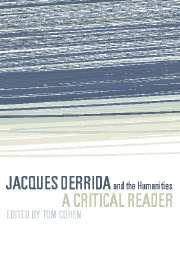Book contents
- Frontmatter
- Contents
- Preface
- Acknowledgements
- Biographical chronology
- Introduction: Derrida and the future of …
- Chapter 1 The future of the profession or the university without condition (thanks to the “Humanities,” what could take place tomorrow)
- Chapter 2 Derrida and literature
- Chapter 3 Derrida and gender: the other sexual difference
- Chapter 4 Derrida and aesthetics: Lemming (reframing the abyss)
- Chapter 5 Derrida and representation: mimesis, presentation, and representation
- Chapter 6 Derrida and philosophy: acts of engagement
- Chapter 7 Derrida and ethics: hospitable thought
- Chapter 8 Derrida and politics
- Chapter 9 Derrida and law: legitimate fictions
- Chapter 10 Derrida and technology: fidelity at the limits of deconstruction and the prosthesis of faith
- Chapter 11 Derrida and history: some questions Derrida pursues in his early writings
- Chapter 12 Derrida and psychoanalysis: desistantial psychoanalysis
- Glossary
- Index
- References
Chapter 9 - Derrida and law: legitimate fictions
Published online by Cambridge University Press: 22 September 2009
- Frontmatter
- Contents
- Preface
- Acknowledgements
- Biographical chronology
- Introduction: Derrida and the future of …
- Chapter 1 The future of the profession or the university without condition (thanks to the “Humanities,” what could take place tomorrow)
- Chapter 2 Derrida and literature
- Chapter 3 Derrida and gender: the other sexual difference
- Chapter 4 Derrida and aesthetics: Lemming (reframing the abyss)
- Chapter 5 Derrida and representation: mimesis, presentation, and representation
- Chapter 6 Derrida and philosophy: acts of engagement
- Chapter 7 Derrida and ethics: hospitable thought
- Chapter 8 Derrida and politics
- Chapter 9 Derrida and law: legitimate fictions
- Chapter 10 Derrida and technology: fidelity at the limits of deconstruction and the prosthesis of faith
- Chapter 11 Derrida and history: some questions Derrida pursues in his early writings
- Chapter 12 Derrida and psychoanalysis: desistantial psychoanalysis
- Glossary
- Index
- References
Summary
Three texts, one law. Or equally, three texts, no founded law, or an unfounded law of anti-foundation. The three texts of Derrida's I am going to base my comments upon are some of those which most overtly, or most directly deal with the question of law. I make this distinction between texts simply for the sake of convenience, since in my view many of Derrida's works in one way or another deal with the question of law. However, those I am here concerned with all name law – “Devant la loi,” “The Law of Genre,” “Force of Law” – and this naming of law has a special significance in the context of this chapter. In its naming, the text proclaims itself and authorizes its legal content: as Derrida comments in “Before the Law”: “A sort of intrigue is already apparent in a title which names the law … a little as if the law had entitled itself.” This comment goes to the very core of the jurisprudential problematic which is my concern here. Self-entitlement of the law is nothing more than a parental “because I say so” translated into a constitutional mandate, and – as the guardian and apologist for legitimacy – mainstream legal philosophy has struggled to escape such arbitrariness by attempting to discover or describe an absolute source of legitimacy.
- Type
- Chapter
- Information
- Jacques Derrida and the HumanitiesA Critical Reader, pp. 213 - 237Publisher: Cambridge University PressPrint publication year: 2002
References
- 2
- Cited by



